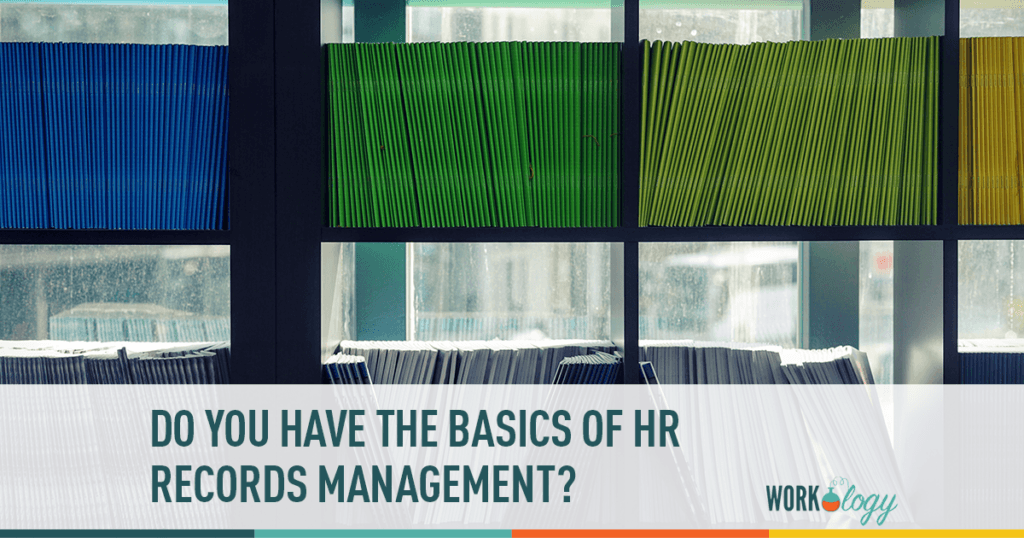Do You Have the Basics of HR Records Management?
HR files and records management. What just happened when you read those words… run the other way because its a hot mess? Sigh, because you know its something you have to do, but don’t have the time for? Gasp, we have a place to put all these files? Act cool, because your files are in order and up to date? My guess is that many of you are somewhere in between. Having a functional and organized HR records process/system (paper or electronic) is must. Yes, you read the parenthetical correctly, the HR technologist just said “paper” (and is being serious). Regardless of how you keep your records – there are a few basics you want to define to achieve “records happiness.”
What’s In and What’s Out
One of the biggest mistakes that I see with HR records is that no one has defined what should go into the file — so they keep EVERYTHING. You’re not sure so you just throw everything in together. Better safe than sorry? WRONG! Its a records nightmare to maintain and organize, but its also just as bad to ‘over-recordkeep.’
Define what is to be part of the each type of employee record and where it is kept. Most of us know the basics of what to keep (and what items we can and can’t keep together) — employment applications, I9, W4s performance reviews, corrective action — do you know what to do with resumes, interview notes, career development plans, customer kudos, awards? If you know, do other HR staff, legal, and managers know? If the answer is a little fuzzy you want to create is a “records keeping guideline.” This guidelines will define all the records you have, who the owner is, where that record is kept, and for how long. A more detailed guideline will even have a destruction schedule which tells you the process and approvals to destroy records. If you have never created one of these before, start broad and then get more detailed or start with a particular type of record area — it can be overwhelming at first when you realize just how much information you’re keeping on your employees or to support work that you’re doing in your HR day to day that you must maintain. There are some great templates out there for free — start with your local SHRM chapter or the SHRM website or a local records management association may be able to assist you.
Lock It Up
I’ve been making references to a “room” of records — truth is, some of you may not have a “room” but may simply have desks or file cabinets for your records. Those of you who are virtual, hang with me. Whatever you keep your records in, ensure that they have a lock and a key — and that you use them regularly. You secure records whenever you are not using them — whether you step away to go to the restroom, lunch, or for the day, lock up the records. For you virtual folks, I’m talking about locking your screens and logging off your systems. Make it a regular habit. Do I think that sounds extreme — no, I don’t. First, its a good habit. Second, when you step away, even if you think its for a quick second, think about how many times you are away longer than you expect. Third, as an HR professional you have access to a lot of personal and confidential data. I like to treat records how I’d want another person to treat my confidential information. Do you get annoyed (or concerned) if you’re at the doctor office and they confirm your information in a loud whisper for everyone in the waiting room to hear or if they leave your stack of confidential paperwork on the counter for anyone with a wandering eye to see or maybe they have your information up on the screen in huge fonts for anyone to see/read? I do. Think I’m uptight? It tells me about their record keeping practices. It tells me that they are not that diligent about protecting data and that they are pretty lax about locking information up. The sick lady in the waiting room may not be writing my information down to use later — but how easy are they making it for the thieves (or just nosey people) who do want this information. Don’t blow this off. Be diligent. Protect your people’s information and don’t give them reason to believe that you don’t take precautions to protect their information. Educate others to so that they have the same standards and that you restrict access to confidential records and files (paper and electronic). For electronic records and files, be sure to partner with your IT or HRIM teams to ensure that they are secured on the network and that you have safe means to transmit data.
Get Regular
Maintaining records is generally one of the first things that gets dropped when workloads get out of hand. That’s okay thinking for a short term, but a records system, not maintained can get out of hand pretty quickly without a regular routine and process to keep it up. It can get to be boring and mundane, but don’t let overshadow the bigger picture . The idea is that when you need the information, it is easy to get to and retrieve (and you know where to go to get it). Ever need a document that you couldn’t find, was incomplete, or out of date? Are there piles of “to be filed” that you don’t recognize? Don’t put yourself (or your a future successor) in that position. You’re maintaining records today to use in the future — get a repeatable process, make it meaningful and get others involved.
What are some of your records management basics?








